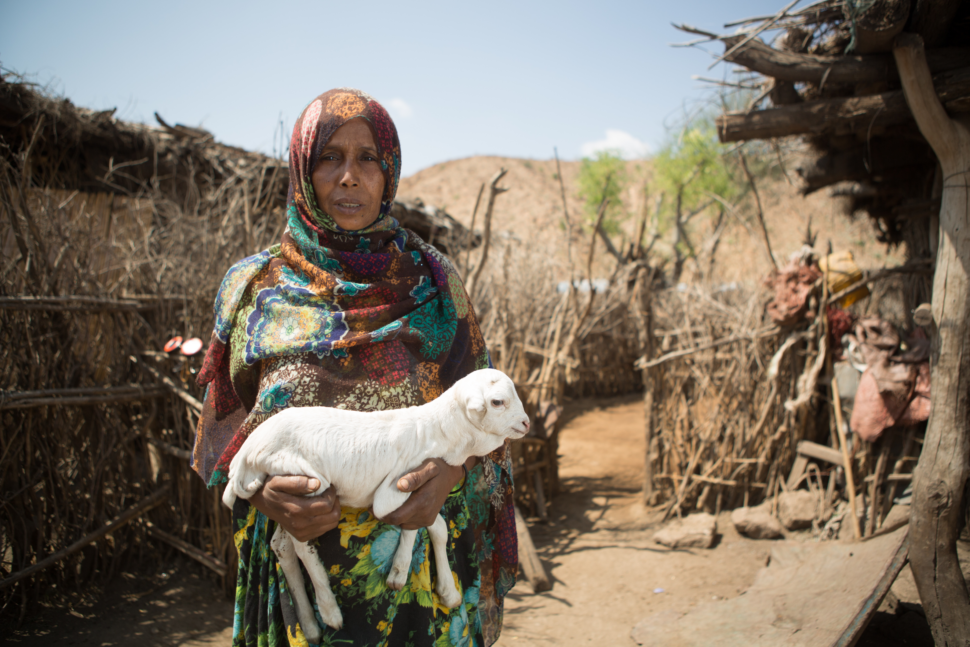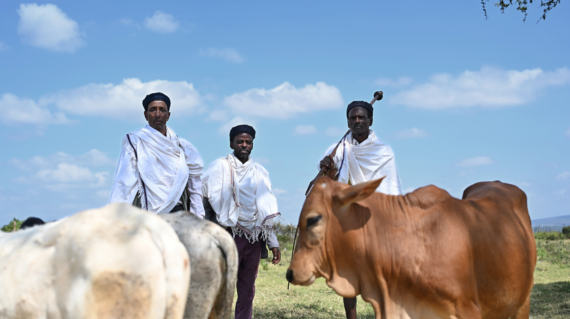New Research Highlights Livestock Solutions for Drought-Prone Ethiopia
New research by VSF Germany shows how Browse-aid, a simple supplement, helps livestock survive droughts by unlocking the potential of shrubs and trees—a cost-effective way to support pastoralist communities.

© VSFG
In the arid regions of Ethiopia, where droughts frequently disrupt the livelihoods of pastoralist communities, recent research offers a practical solution. A study conducted by VSF Germany and its partners explores the potential of a dietary supplement called Browse-aid to enhance livestock survival during periods of severe feed scarcity. The findings provide valuable insights into improving drought resilience, not only in Ethiopia but across the Horn of Africa.
The Challenge: Livestock Loss During Droughts
For many communities in Ethiopia, livestock are essential for food security, income, and cultural identity. However, during droughts, the lack of grass and feed resources leads to significant livestock losses. Shrubs and trees, which are more abundant than grasses during these times, are often underutilized due to tannins—compounds that make them less palatable and reduce nutrient absorption. Addressing this challenge has the potential to transform livestock management during droughts.
The Solution: Browse-Aid
This study examined the use of Browse-aid, a supplement that neutralizes tannins in shrubs and trees. Conducted in two drought-affected sites in Ethiopia, the research found that small daily doses of Browse-aid improved livestock health and survival. The supplement increased body weight gains, enhanced body condition scores, and improved physical indicators such as coat appearance and eye brightness.
Farmers’ Feedback and Future Use
The livestock farmers who participated in the field trials were initially skeptical about the small amounts of Browse-aid. However, they were impressed by the significant improvements in animal growth and condition. Farmers noted that while neighboring animals lost weight during the drought, those receiving Browse-aid maintained better body condition and weight. Interest in adopting this solution spread quickly among the surrounding communities. To promote further adoption, Farmer (Pastoralist) Field Schools could be used as platforms to test and expand the Browse-aid approach in the future.

© VSF G
Key Results
The study identified several notable outcomes:
- Enhanced Livestock Health: Animals receiving Browse-aid demonstrated better body weight, shinier coats, and improved overall health compared to those in control groups.
- Cost Savings: The intervention reduced feed costs by 60% for sheep and goats and by up to 90% for cattle, making it a cost-effective alternative to traditional emergency feeding methods.
- Positive Community Feedback: Participating pastoralists reported clear improvements in their animals’ conditions, leading to increased interest and confidence in this approach.
A Scalable Strategy for the Horn of Africa
Although the study focused on Ethiopia, its findings have broader implications for other drought-prone areas. By enabling livestock to consume underutilized shrubs and trees, Browse-aid offers a sustainable and affordable strategy to mitigate livestock losses and support pastoralist livelihoods. This aligns with VSF Germany’s broader mission to improve food security through innovative, animal-centered approaches.
Conclusion
With droughts becoming more frequent due to climate change, practical solutions like Browse-aid are increasingly vital. This research emphasizes the importance of supporting pastoralist communities with effective, accessible interventions. Through ongoing efforts, VSF Germany aims to deliver solutions that strengthen the resilience of those who depend on livestock for their survival.
Read the Full Study
Learn more about the detailed methodology and findings by downloading the full study. Discover how Browse-aid functions and its potential role in addressing drought resilience in East Africa.
Support our mission to create sustainable change—one community at a time.
Acknowledgment of Partners and Funders
This research was made possible through funding from the MasterCard Foundation, coordinated by the Food and Agriculture Organization of the United Nations (FAO) Office in Addis Ababa, Ethiopia. The study was conducted in collaboration with Vétérinaires Sans Frontières Suisse (VSF Suisse), and the FAO.